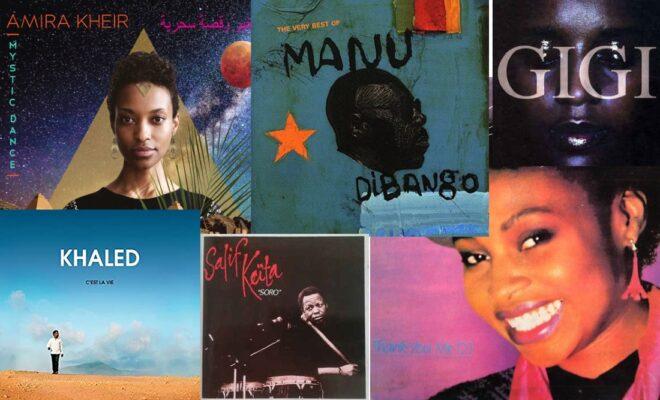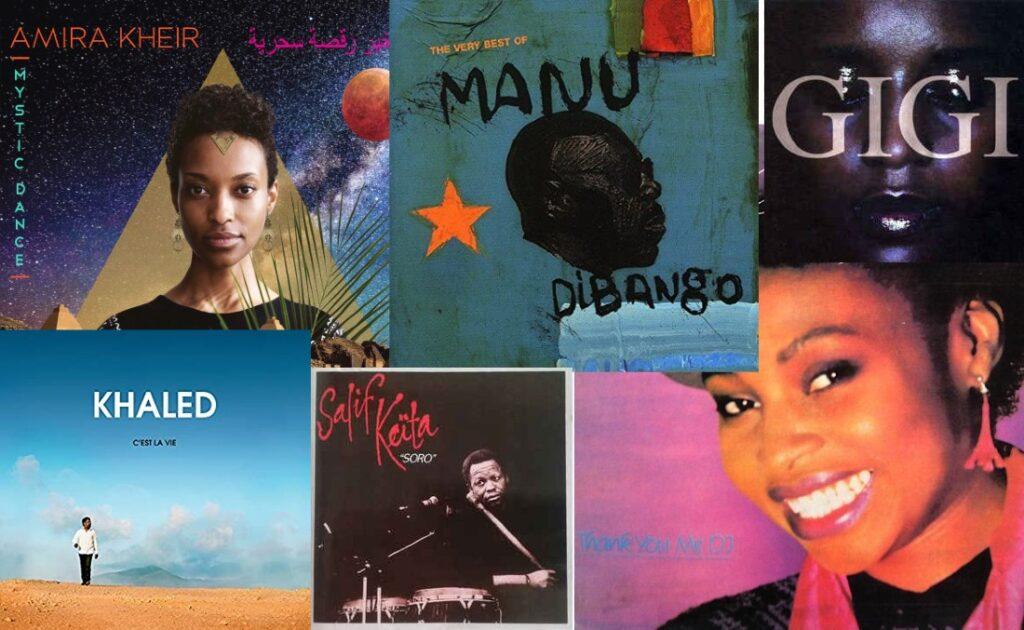Lockdown and listen: Classic African albums to discover, old and new


Read all our COVID-19 coverage
What is a better way to spend your time during lockdown than discovering or revisiting some of the finest music to have come from Africa? From famous classics to lesser known works, from the throbbing sounds of the West African belt to the eclectic mix reaching out from the North, Africa’s sonic history is rich and varied. The creators of these works have a few things in common: the ability to create influence; to speak to audiences across age, time and language; and to last.
And so, for your consideration (and with a choice of links to where you can listen, though not all services are available everywhere):
Thank You Mr DJ (1987) – Yvonne Chaka Chaka (South Africa)
It isn’t for nothing that Yvonne Chaka Chaka is known as the princess of Africa. Her singalong anthems became the soundtrack of the 1980s and 1990s for millions of music lovers across the continent. Thank You Mr DJ isn’t necessarily her finest body of work, but it is her most joyous album, featuring some of the biggest tunes of her career and helping to advance the acceptance of electronic music in its earlier forms. “Umqombothi” is a pop classic and party starter and the title track is still as irresistible as it was 30 years ago.
Where to listen: Apple Music/Deezer/GooglePlay/Spotify
Africadelic: The Very Best of Manu Dibango (2003) – Manu Dibango (Cameroon)
Cameroonian legend Emmanuel N’Djoké “Manu” Dibango passed away this March aged 86 after contracting COVID-19. A renowned songwriter and saxophonist, Dibango was introduced to a new generation of music lovers in 2009 when he sued both Michael Jackson and Rihanna for lifting the hook from his signature tune “Soul Makossa” for their respective singles “Wanna be Startin’ Somethin’“and “Don’t Stop the Music”. Africadelic contains “Soul Makossa” in all its vibrant, funky energy as well as 13 other essentials that highlight Dibango’s pioneering work with Afro-jazz and funk.
Where to listen: Dicogs
Gigi (2001) – Gigi (Ethiopia)
Criticised upon initial release for departing radically from the foundations of Ethiopian popular music – traditional pentatonic scales with jazz and R&B – this self-titled record by Ejigayehu Shibabaw assembled a who’s who of American jazz talent (including Grammy winner Herbie Hancock) and updated the Ethiopian pop sound to include dub and electronic music. The result is a fiery, unyielding wake-up call that moves from uplifting passages to mellow soulful ballads.
Where to listen: Apple Music/Discogs/Spotify/Youtube
Soro (1987) – Salif Keita (Mali)
Produced by Ibrahima Sylla, Salif Keita’s international breakthrough Soro is credited for defining the template for how African albums would sound after it. It blends the traditional griot music of Keita’s Mali with Euro-pop sounds and shiny up-to-date production. The record’s dynamic energy – brass riffs, soaring synthetic keyboards, electric guitars, drums, drums and more drums – is contrasted with Keita’s soothing, stunning vocal delivery.
Where to listen: Apple Music/Discogs/Spotify
C’est La Vie (2012) – Khaled (Algeria)
Perhaps the world’s most famous Arab voice, Khaled is best known for tunes like Aïcha and Didi. You will have heard them even if you don’t quite know who Khaled is. C’est La Vie isn’t the record that quintessential Khaled fans will return to every year, but having sold a whopping 4.6 million copies worldwide, it may well be his most accessible. For C’est La Vie, Khaled worked with Moroccan-born producer RedOne, famous for his work with Lady Gaga. The result is a blend of huge stadium arena anthems with Algerian dance styles.
Where to listen: Apple Music/Deezer/Discogs
Mystic Dance (2018) – Amira Kheir (Sudan)
Mystic Dance is the latest album from the performer who has been christened the diva of the Sudanese desert. With the record, Amira Kheir continues to wear influences from her multicultural heritage, mixing traditional Sudanese tunes with soul, jazz, Nubian and middle Eastern harmonies. Mystic Dance showcases a musician increasingly confident in her abilities as a singer and composer. Warm and soothing, Mystic Dance is near perfect fusion and a compelling journey worth taking.
Where to listen: Apple Music/Bandcamp/Deezer/Discogs/Spotify
Celia (2019) – Angelique Kidjo (Benin)
Angélique Kidjo’s latest, the Grammy winning Celia, is a towering homage to the work and music of Celia Cruz, perhaps Cuba’s most prominent vocalist. Kidjo’s album may have been released last year, but the songs that inspired it span several decades of Cruz’s stellar career, from 1960 to her rise to the title of queen of salsa and her 1998 late career hit “La Vida Es Un Carnaval”. With assistance from drummer Tony Allen and the West African Gangbé Brass Band, Kidjo reimagined Celia’s work upping the Afrobeat sensibility and making it in her own image.
Where to listen: Apple Music/Deezer/Discogs/Spotify
Coupé Bibamba (1998) – Awilo Longomba (DR Congo)
Awilo Longomba has set dance floors afire from Lagos to London. Coupé Bibamba is considered one of the most influential and commercially successful records to come from Africa. It cemented Longomba’s reputation as the king of techno soukous. 20-plus years later, anthems like the title track and “Gâté le Coin” have lost none of their seductive, compulsive power. Resistance is futile whenever this record comes on.
Where to listen: Apple Music/Deezer/Discogs/Google Play/Spotify
Dunya (2004) – Malouma (Mauritania)
At home, Malouma wears many hats. Griot, performer, politician, activist and feminist icon are just a few. Dunya is a representation of a lot of her interests, bridging the gap between traditional folkloric songs and modern recordings. The music on Dunya is an intoxicating blend of guitars, harps, flutes and skin drums with traditional instruments like the tidinit. The album is an inclusive affair, highlighting the diversity and fluidity of modern-day Mauritania.
Where to listen: Apple Music/Deezer/Discogs/Spotify
Neria Soundtrack (2008) – Oliver Mtukudzi (Zimbabwe)
Oliver Mtukudzi co-starred in and wrote the music for the 1993 Zimbabwe film Neria, a drama about a woman denied the right to inheritance after her husband passes away. The soundtrack album contains eleven tracks of vintage Mtukudzi. Performing predominantly in his native Shona but also in English, Mtukudzi is in his terrific form with his distinctive husky voice sharing centre stage with his dazzling guitar. Lead single Neria remains one of his biggest hits.
Where to listen: Deezer/Discogs/Spotify/Youtube






